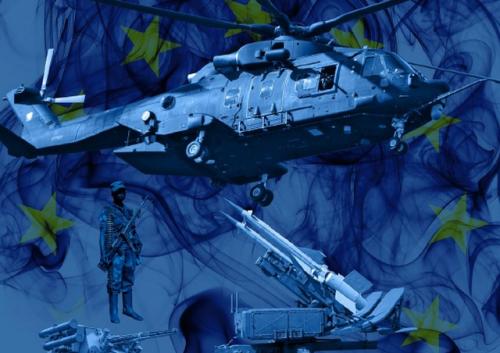Smoking guns
The role of European arms trade policies that facilitate gross human rights violations in third countries is often absent from displacement and migration studies.
- Análisis

The nexus between the arms trade and forced displacement is rarely explored and the role of European arms trade policies that facilitate gross human rights violations in third countries is often absent from displacement and migration studies. This report joins the dots between Europe’s arms trade and forced displacement and migration.
Key findings
• Arms and military equipment manufactured and licensed in Europe and sold to third countries provokes forced displacement and migration. This arms trade is motivated by how highly lucrative the industry is and current control and monitoring mechanisms facilitate rather than curtail problematic licencing and exportation.
• The arms trade is political and is driven by profit but is under-regulated. Although other sectors, such as food and agriculture, do not undermine the fundamental right to life and other human rights in the same way that the arms trade does, they are far more stringently regulated.
• It is possible to methodically trace arms, military equipment and technology, from the point of origin and export to where these were eventually used, and document their devastating impact on the local population. The report confirms beyond any reasonable doubt that European arms are directly used not to defend populations or to enhance local or regional security as is often claimed, but to destabilise entire countries and regions.
• The arms industry is involved in clear violations of non-transfer clauses and end user agreements (EUAs) despite a supposedly robust system of controls. The evidence shows that once arms are traded, and although they may be traced, it is virtually impossible to control how they may eventually be used. Furthermore, although importing countries were known to have breached EUAs, EU member states continued to sell them arms and military equipment.
• Regardless of whether arms were exported to official state security forces or were eventually used by non-state armed actors, or whether EUAs and other control mechanisms were respected, the result was the same – European arms were used in military operations that led to destabilisation and resulting forced displacement and migration. The destabilisation, facilitated by arms supplied by Europe, then contributed to Europe hugely expanding its border security apparatus to respond to the apparent threat posed by refugees attempting to arrive and seek asylum.
• European countries are among the top exporters of lethal arms equipment worldwide, comprising approximately 26% of global arms exports since 2015. The top five European arms exporters are France, Germany, Italy, Spain and the UK – together accounting for 22% of global arms exports in the 2016–2020 period.
• Arms exports from Bulgaria, Croatia and Romania have soared in recent years, a large proportion of which is exported to West Asian countries. For example, before 2012, Croatia exported ammunition worth less than €1 million a year, but with the start of the Syrian war this surged every year to reach €82 million in 2016. The European Parliament called on Bulgaria and Romania to stop arms exports to Saudi Arabia and the US (if there was a risk that these arms may be diverted), so far to no avail.
• In Syria an estimated 13 million people need humanitarian assistance and more than half of the population remains displaced from their homes – including 6.6 million refugees living in neighbouring countries, such as Jordan and Lebanon, who subsequently attempt to flee to Europe in a reverse movement to the arms that displaced them. Another 6.7 million are internally displaced persons (IDPs) inside Syria.
…Continue reading in the pdf file below
Smoking guns is part of TNI's Border Wars Series, which looks at the globalisation of border security, the way it criminalises refugees and those who support them, the policies that have put security above human rights, and the corporations profiting from it.
https://www.tni.org/en/publication/smoking-guns
Del mismo autor
- Smoking guns 27/08/2021
Clasificado en
Clasificado en:
Guerra y Paz
- Prabir Purkayastha 08/04/2022
- Prabir Purkayastha 08/04/2022
- Adolfo Pérez Esquivel 06/04/2022
- Adolfo Pérez Esquivel 05/04/2022
- Vijay Prashad 04/04/2022
